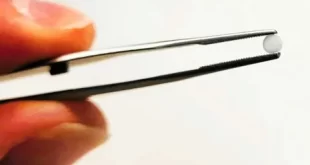Imagine a world where the surfaces in hospitals, restaurants, and public spaces instantly neutralize bacteria, even the most resistant strains. This dream is on the verge of becoming reality, thanks to groundbreaking research by a team of scientists at Georgia Tech. Led by PhD student Anjua Tripathi, the team has developed a new copper-enhanced stainless steel that fiercely targets bacteria, including antibiotic-resistant strains. This breakthrough could revolutionize the fight against hospital-acquired infections and curb the spread of superbugs.
An innovative process combining steel and copper
The team created this antibacterial material using a clever electrochemical process. First, they etched the surface of stainless steel to form thousands of sharp micropoints. Then, through a second electrochemical step, they embedded copper ions onto these points.
This material fights bacteria on two fronts:
- The micropoints tear apart bacterial membranes.
- The copper, renowned for its antibacterial properties since antiquity, destroys bacterial cells.
Laboratory-proven effectiveness
Lab tests confirmed the remarkable potential of this innovative material. In just 30 minutes, it reduced Gram-negative bacteria like E. coli by 97% and Gram-positive bacteria like Staphylococcus epidermidis by 99%, all without any chemical agents.
Anjua Tripathi explains, “Killing Gram-positive bacteria is relatively easy, but tackling Gram-negative bacteria is challenging due to their thick multi-layered cell membrane.”
An affordable and durable material
One of the key advantages of this antibacterial steel is its affordability, as it only requires a thin layer of copper. Additionally, its mechanical action prevents bacteria from developing resistance, unlike chemical treatments.
Multiple promising applications
The researchers foresee numerous potential applications for their invention: coating surfaces, equipment, and instruments in hospitals and clinics; manufacturing surgical implants and medical prosthetics; outfitting professional kitchens and food preparation areas; and covering door handles, water fountains, and other frequently touched surfaces in public spaces.
With the alarming rise of antibiotic-resistant bacteria, this copper-infused stainless steel offers exciting prospects for slowing the spread of infections and protecting public health.
The next steps for the Georgia Tech team include testing their revolutionary material on a larger scale and exploring commercial opportunities. Their innovation brings new hope in the global fight against superbugs.
 Etudes Non Stop Study Non Stop
Etudes Non Stop Study Non Stop



